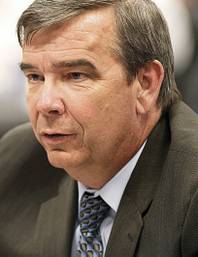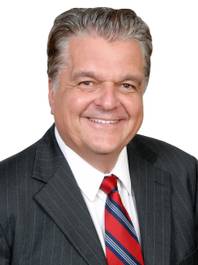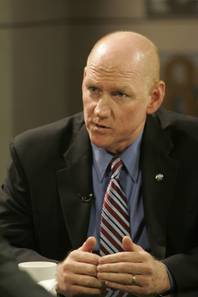Wednesday, Jan. 27, 2010 | 2 a.m.

Sheriff Doug Gillespie
Sun archives
- Las Vegas mayor calls on city employee unions to reopen contracts (1-7-2010)
- Las Vegas City Council OKs 8 percent salary, benefits cut (1-6-2010)
- Pay and program cuts, layoffs: All possible (1-3-2010)
- Clark County cost-cutting ideas center on salaries (12-30-2009)
- Las Vegas to lay off 19 city employees as part of budget cuts (11-18-2009)
- Metro Police union ratifies contract without cost-of-living raises (4-6-2009)
- Police union for civilians OKs more meager wage increase (4-3-2009)
- Those that pay Metro's bills - city, county - might get more say (3-1-2009)
- Second thoughts on second half of tax (2-25-2009)
- Bill to raise sales tax to hire more cops proposed for 2009 session (9-2-2008)
- Police make pitch to voters (9-24-2004)
Beyond the Sun

Steve Sisolak

Larry Brown
For the first time in its 37-year history, Metro Police will bring in a budget smaller than the year before.
Metro’s budget has increased an average of 10 percent a year over the past 25 years, according to Clark County. But the police department is cutting spending as its two primary funding sources — Clark County and Las Vegas — face unprecedented declines in tax revenue. (Clark County expects a deficit of up to $200 million in fiscal year 2011, which begins July 1.)
The smaller police budget, however, could place in jeopardy another source of department revenue, which voters approved to put more officers on the street — the so-called “More Cops” quarter-cent sales tax adopted in 2005.
Metro attorney Liesl Freedman drafted a memo noting that the state law that implemented the More Cops tax is ambiguous enough that it could be interpreted as calling for a suspension of the tax if Metro’s operational budget decreases from one year to the next.
As it was sold to voters, the More Cops tax was to put more officers on the street and not replace the contributions to Metro’s budget from Las Vegas and Clark County.
“The More Cops legislation is ... ambiguous because it does not address what (Fiscal Affairs) is supposed to do if a funding body reduces its year-over-year contribution” to Metro, Freedman’s memo said.
Freedman concluded that the law’s purpose is hiring more cops. Without clarification, to assume that More Cops spending should cease if county and city funding drops, “would be contrary to and undermine the purpose of the legislation: to put more uniform officers on the streets,” Freedman wrote.
The quarter-cent sales tax is collected throughout the county and divided according to population among the county’s various police agencies, including North Las Vegas and Henderson. Using the money, Metro has hired 584 officers.
Metro’s More Cops budget is about $64 million this year. The department’s operational budget, which doesn’t include More Cops money, is $549.2 million, with about $216 million coming from Clark County’s general fund, $137 million from Las Vegas, $167 million from property taxes and the rest from a variety of sources and fees.
Metro is considering a 5 percent, or about $30 million, cut to its budget, according to sources.
Metro’s Fiscal Affairs Committee debated this week the effect of a smaller budget on the More Cops money.
Steve Wolfson, one of two Las Vegas councilmen on the committee, wondered if the department should seek a legal opinion from the Legislative Counsel Bureau, the legal arm of the Legislature, “to avoid a potential problem.”
Steve Sisolak, one of two Clark County commissioners on the committee, suggested seeking an opinion from the Nevada attorney general rather than relying solely on Metro’s legal counsel. “This could be an enormous (financial) burden” if Metro’s interpretation is wrong, Sisolak said.
Any taxpayer would have legal standing to challenge Metro’s interpretation of the law, noted Mary Ann Miller, the deputy district attorney who represents the County Commission.
Sheriff Doug Gillespie countered that seeking other opinions could lead to the state taking some of the money. There are “other things they might think would be more appropriate to spend the money on,” Gillespie said.
During the 2009 Legislature, lawmakers took about $180 million in Clark County revenue.
The More Cops reserve has a balance of about $143 million. During the session, Gillespie was criticized for the size of the reserve and questioned about its use, he said.
“We need this money in case of a downturn, in case (the sales tax) doesn’t produce to the level that is projected,” he said. “I think it’s very hard to refute what’s been done with this money. I would say if it’s messed with at all, that there would be a backlash from the taxpayers because I think the taxpayers like the reduction in crime. I think the taxpayers like the additional police officers out there, and if we didn’t have this tax we wouldn’t have those officers.”
Gillespie said he is working on reducing the department’s More Cops budget by the same percent as the department’s operational budget.
County Commissioner Larry Brown agreed with Gillespie.
“I’m not sure we need to ask anybody anything,” Brown said. “With everything else going on, the more we ask outsiders to come in, the more we’re asking for trouble ... Let’s just handle our business the way we’ve always handled our business — the sheriff, the staff.
“And if anyone wants to take a look, invite them, invite them all.”
The committee decided against seeking additional legal opinions.

Join the Discussion:
Check this out for a full explanation of our conversion to the LiveFyre commenting system and instructions on how to sign up for an account.
Full comments policy